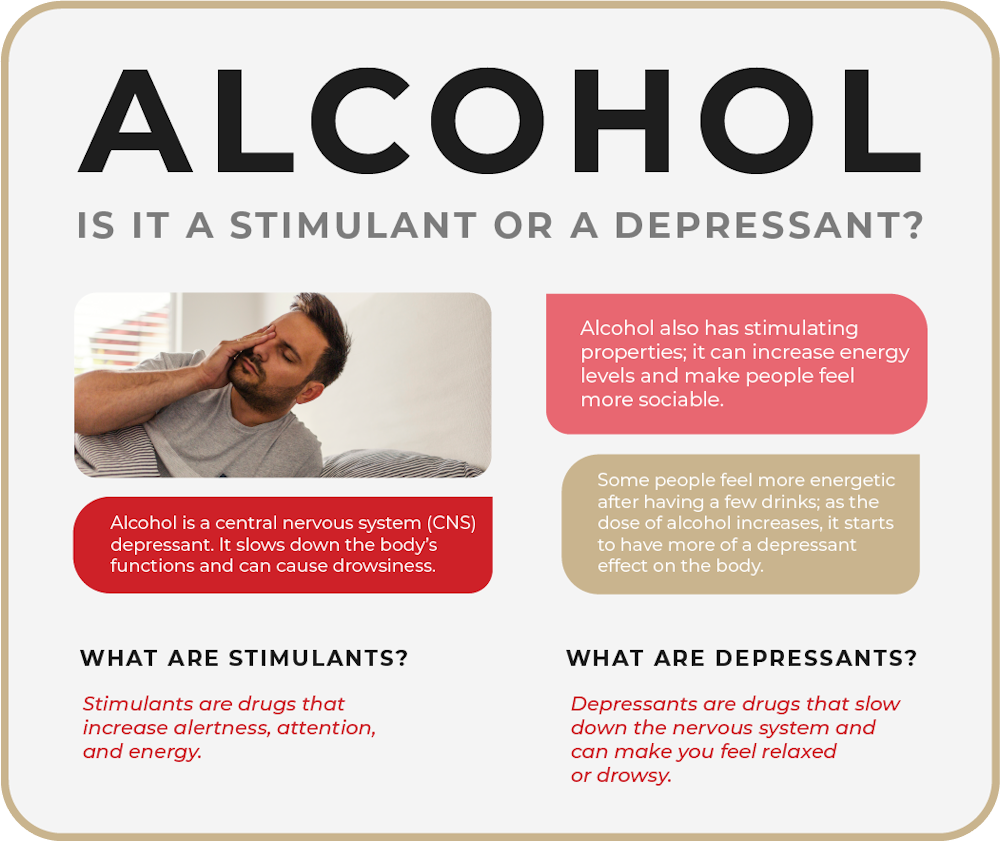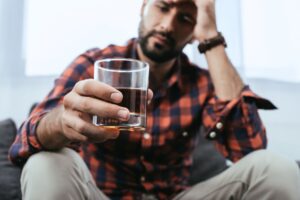Is alcohol a stimulant or depressant? Alcohol is a central nervous system (CNS) depressant. It slows down the body’s functions and can cause drowsiness.
 However, alcohol also has stimulating properties. For example, it can increase energy levels and make people feel more sociable. The effects of alcohol depend on many factors, including how much gets consumed, how quickly it gets consumed, and an individual’s tolerance level.
However, alcohol also has stimulating properties. For example, it can increase energy levels and make people feel more sociable. The effects of alcohol depend on many factors, including how much gets consumed, how quickly it gets consumed, and an individual’s tolerance level.
In general, the effects of alcohol are more likely to be negative than positive. Alcohol use can lead to risky behavior, such as driving while intoxicated. It is important to drink responsibly and to understand the effects that alcohol can have on the body.
So, is alcohol a stimulant or depressant? It is both. However, at low doses, alcohol can act as a stimulant.
For this reason, some people feel more energetic after having a few drinks. But, as the dose of alcohol increases, it starts to have more of a depressant effect on the body. Therefore, excessive drinking can lead to dangerous behavior.
Does Alcohol Give You Energy?
Several people believe alcohol is a stimulant because it can make you feel more energetic. However, alcohol is a depressant. So, why does it seem to give you energy?
The reason that alcohol gives energy is that it affects the central nervous system. It slows down brain function and reduces inhibitions. Alcohol leads people to feel more relaxed and less inhibited. As a result, people may act more energized than they are.
What Are Stimulants?
Stimulants are drugs that increase alertness, attention, and energy. They can also make you feel more confident and increase your heart rate and blood pressure. Some common stimulants include caffeine, amphetamines, and cocaine.
Stimulants or ‘Uppers’
Stimulants are called uppers because they make you feel more awake, increase heart rate, and blood pressure, and can make you feel more confident. They work by increasing the activity of the central nervous system.
What Are the Effects of Stimulants?
The effects of stimulants can last anywhere from a few hours to several days. Some of the short-term effects of stimulants include:
– Increased alertness
– Improved mood
– More energy
– Faster heart rate
– Higher blood pressure
– Dilated pupils
– Decreased appetite
Long-term effects of stimulants can include:
– Addiction
– Anxiety
– Depression
– Paranoid thoughts
– Hallucinations
What Are Some Examples of Stimulants?
Caffeine is a stimulant found in coffee, tea, and energy drinks. Amphetamines are stimulants used to treat attention deficit hyperactivity disorder (ADHD). Cocaine is a powerful stimulant abused for its euphoric effects. Nicotine is another stimulant found in tobacco products.
What Are the Stimulating Effects of Alcohol?

While alcohol is technically a depressant, it can have stimulating effects in small doses because alcohol inhibits the brain’s ability to process information. As a result, you may feel more alert and talkative when you first drink alcohol. However, these effects will wear off as your body absorbs the alcohol and its sedating effects take over.
What Are Depressants?
Depressants are drugs that slow down the nervous system and can make you feel relaxed or drowsy. They can also decrease your heart rate and blood pressure.
What Are the Effects of Depressants?
The effects of depressants depend on the drug, the dose, and how you take it. Common effects include:
– Drowsiness
– Slowed heart rate
– Lowered blood pressure
– Difficulty concentrating
– Impaired coordination
What Are Some Examples of Depressants?
Common depressants include alcohol, benzodiazepines, and barbiturates. Alcohol is a depressant found in beer, wine, and liquor. Benzodiazepines are depressants used to treat anxiety disorder and insomnia. Barbiturates are another type of depressant used to treat seizures.
What Is Binge Drinking and How Can It Lead To Alcohol Poisoning?
Drinking too much alcohol which can lead to alcohol poisoning. Binge drinking is a pattern of drinking that brings a person’s blood alcohol concentration (BAC) to 0.08 grams% or above; which happens when men consume five or more drinks or when women consume four or more drinks in about 2 hours.
Binge drinking is a problem because it can lead to alcohol poisoning and a medical emergency. Alcohol poisoning occurs when a person’s BAC is 0.40 or higher; it can happen when someone drinks a large amount of alcohol in a short period or drink alcohol more slowly over a long period. Alcohol poisoning can cause coma and even death.
Symptoms of alcohol poisoning include:
– Vomiting
– Confusion
– Seizures
– Slow breathing
– Low body temperature
– Passing out
If you see someone who is showing these signs, seek medical help. It’s important to know that drinking too much alcohol is not only dangerous but is also illegal. In the United States, it is illegal to drink alcohol if you are under the age of 21. If caught drinking alcohol, a fine can occur or even go to jail.
What Are the Effects of Alcohol?
 The effects of alcohol depend on the amount consumed. Small amounts of alcohol may make you feel relaxed and lower your inhibitions. However, large amounts of alcohol can lead to slurred speech, vomiting, and loss of consciousness. Drinking too much alcohol can be dangerous and even life-threatening.
The effects of alcohol depend on the amount consumed. Small amounts of alcohol may make you feel relaxed and lower your inhibitions. However, large amounts of alcohol can lead to slurred speech, vomiting, and loss of consciousness. Drinking too much alcohol can be dangerous and even life-threatening.
How Can Alcohol Lead To Dangerous or Risky Behavior?
The effects of alcohol can sometimes lead people to behave in risky ways. For example, drinking too much alcohol can impair your judgment; you might make poor decisions, like drunk driving. Drinking too much alcohol can also lead to violence and aggression. If you drink too much alcohol, seek medical help immediately.
The inhibitory effects of alcohol can lead people to do things that they wouldn’t normally do. For example, you may be more likely to take risks when drunk, such as having unprotected sex. Drinking too much alcohol can also lead to blackouts; when you can’t remember what happened while drinking. Blackouts can be dangerous because you may not remember how much alcohol got consumed or what you did while blacked out.
Is Alcohol a Hallucinogen?
No, alcohol is not a hallucinogen. A hallucinogen is a substance that causes you to see, feel, or hear things that are not there. LSD, magic mushrooms, and mescaline are examples of hallucinogens. Alcohol can cause you to see things that are not there (e.g., visual hallucinations), but it’s not a hallucinogen.
Is Alcohol a Central Nervous System Stimulant?
No, alcohol is not a central nervous system stimulant. A central nervous system stimulant is a substance that increases activity in the brain and spinal cord. Methamphetamine is a stimulant; caffeine and nicotine are examples of central nervous system stimulants. Although alcohol may make you more alert and give you a false sense of confidence, it’s not a central nervous system stimulant.
Why Do You Fall Asleep Quicker From Drinking?
Alcohol is a central nervous system depressant; it slows down brain activity. For this reason, some people might feel sleepy after drinking alcohol.
Although alcohol is a depressant, it can cause stimulant-like effects at low doses because alcohol lowers inhibitions and releases dopamine; a neurotransmitter that helps control the brain’s reward and pleasure centers.
Dopamine is also released when you use other drugs, such as cocaine and methamphetamine. For this reason, alcohol is a gateway drug.
Alcohol as a Gateway Drug
Alcohol is a gateway drug because it can lead to the use of drugs. Studies have shown that people who start drinking early are more likely to develop problems with alcohol and other drugs later in life.
One theory is that this is due to the release of dopamine. When alcohol gets consumed, it increases dopamine levels in the brain. From there, it reinforces the pleasurable effects of drinking and can make someone want to drink more.
Over time, this can lead to tolerance. Tolerance occurs when someone needs to drink more alcohol to feel the same effects. It can also lead to dependence. Dependence is when someone requires alcohol to function normally.
Dependence can lead to addiction. Addiction is a chronic condition characterized by compulsive drug-seeking and use despite harmful consequences.
People addicted to alcohol may have trouble controlling their drinking, feel an urge to drink even when they’re not physically thirsty, and may need to drink more and more to get the same effects.
At high enough doses, alcohol can be fatal. It can cause respiratory depression. Respiratory depression occurs when breathing slows down or stops altogether. Alcohol poisoning is a potentially deadly consequence of excessively drinking.
Issues With Long-Term Drinking
Even moderate drinking can be risky. It can contribute to car accidents, falls, drownings, and other accidents. Alcohol is also a factor in domestic violence, sexual assault, and child abuse.
People who drink heavily for long periods are more at risk of developing chronic health problems such as liver disease, heart disease, cancer, and pancreatitis. Drinking during pregnancy can cause birth defects and learning disabilities in children.
Heavy drinking can also lead to mental health problems such as depression, anxiety, and psychosis.
Get Help for Alcohol Addiction With First City Recovery Center
 If you or someone you love is struggling with alcohol addiction, don’t wait to get help. First City Recovery Center is here to provide the treatment and support you need to overcome your addiction and build a healthier, happier life. Contact us today to learn more about our programs and how we can help you on your journey to recovery.
If you or someone you love is struggling with alcohol addiction, don’t wait to get help. First City Recovery Center is here to provide the treatment and support you need to overcome your addiction and build a healthier, happier life. Contact us today to learn more about our programs and how we can help you on your journey to recovery.
There are treatment options, including detoxification, rehabilitation, and support groups. Alcoholics Anonymous is one example of a support group that can help people recovering from alcoholism. Seek help from a medical professional if you or someone you know is struggling with alcohol addiction.
















